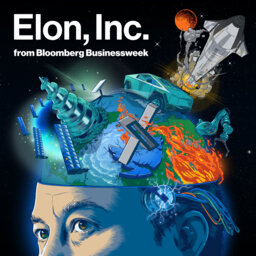Inside Musk's Plans for Mars, What's Going On with Tesla and xAI
Does Elon Musk consider all of his companies to be one giant company? That’s something that comes up in today’s episode as host David, Dana and Max consider a recent report on Tesla potentially giving up future revenue in exchange for access to Musk’s artificial intelligence startup, xAI access. That brings up corporate governance issues.
And then, Dana speaks to New York Times reporter Kirsten Grind about a story she wrote on Musk’s plans regarding Mars.
In 1 playlist(s)
Elon, Inc.
Elon Musk’s sprawling business empire has granted the billionaire a degree of power and global influ…Social links
Follow podcast
Recent clips

Introducing: The Mishal Husain Show
02:19

Everybody's Business: Will the Shutdown Lead to DOGE 2.0?
42:18

Everybody's Business: Elon Inc's Host Explains the Mess in Argentina
42:48
 Elon, Inc.
Elon, Inc.